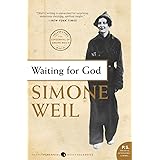
Download the free Kindle app and start reading Kindle books instantly on your smartphone, tablet, or computer - no Kindle device required.
Read instantly on your browser with Kindle for Web.
Using your mobile phone camera - scan the code below and download the Kindle app.

OK
Waiting for God Paperback – December 26, 2000
Emerging from thought-provoking discussions and correspondence Simone Weil had with the Reverend Father Perrin, this classic collection of essays contains her most profound meditations on the relationship of human life to the realm of the transcendant. An enlightening introduction by Leslie Fiedler examines Weil's extraordinary roles as a philosophy teacher turned mystic. "One of the most neglected resources of our century ", Waiting for God will continue to influence spiritual and political thought for centuries to come.
- Print length192 pages
- LanguageEnglish
- PublisherHarpPerenM
- Publication dateDecember 26, 2000
- Dimensions5 x 0.5 x 8 inches
- ISBN-100060959703
- ISBN-13978-0060959708
Customers who viewed this item also viewed
Editorial Reviews
Review
"By now Simone Weil has become a legend and her writings are regarded as a classic document of our period." -- The New Yorker
"In an age of inspirational books without inspiration, her writing is unmatched for surprising, sometimes shocking, spiritual insight." -- New York Times
"Madameoiselle Weil is the most truly spiritual writer of this century." -- André Gide
"One of the most neglected resources of our century." -- Adrienne Rich
About the Author
Simone Weil (1909-1943) was born in Paris and died in Ashford, England. A religious philosopher, essayist, dramatist, and poet, as well as a social critic and political activist, Weil was one of the great thinkers of the twentieth century. Her other works include Gravity and Grace and The Need for Roots.
Product details
- Publisher : HarpPerenM (December 26, 2000)
- Language : English
- Paperback : 192 pages
- ISBN-10 : 0060959703
- ISBN-13 : 978-0060959708
- Item Weight : 6.4 ounces
- Dimensions : 5 x 0.5 x 8 inches
- Best Sellers Rank: #2,384,943 in Books (See Top 100 in Books)
- #64,653 in Philosophy (Books)
- Customer Reviews:
About the author

Discover more of the author’s books, see similar authors, read author blogs and more
Customer reviews
Customer Reviews, including Product Star Ratings help customers to learn more about the product and decide whether it is the right product for them.
To calculate the overall star rating and percentage breakdown by star, we don’t use a simple average. Instead, our system considers things like how recent a review is and if the reviewer bought the item on Amazon. It also analyzed reviews to verify trustworthiness.
Learn more how customers reviews work on Amazon-
Top reviews
Top reviews from the United States
There was a problem filtering reviews right now. Please try again later.
Weil's attempted life of sacrifice, coupled with her willingness to be rescued by her rich parents each time the sacrifices seem to go too far, seem like the stuff of spiritual soap opera, not great religious vision. Her solidarity with the poor and the working class, while well-meaing, is ultimately a failure, and her attempt to teach the Upanishads to factory workers seems like comedy of the absurd.
Her religious writing is not much different. Full of extremes, and paradoxes, and sometimes unnecessary verbosity, she strives for solidarity with a world of which, as she clearly states, she can never be fully a part. This, to me, now seems a peculiar act of self-loathing, and her anorexia is only further confirmation of this point.
Perhaps she is pointing the way of how not to be a saint. Anyhow, the reading is engaging. Leslie Fiedler's introduction, now 50 years old, shows its age, and as a religious commentator, he was frankly unqualified to begin with.
So read it for the peculiar period piece that it is, and for the example of a flawed, yet highly dedicated life.







